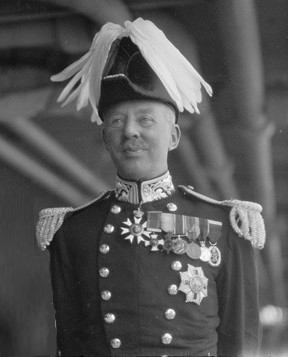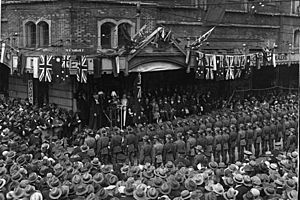William Campion (governor) facts for kids
Quick facts for kids
Sir William Campion
KCMG, DSO, TD, DL
|
|
|---|---|

Campion in 1924
|
|
| 21st Governor of Western Australia | |
| In office 28 October 1924 – 9 June 1931 |
|
| Monarch | George V |
| Premier | Philip Collier James Mitchell |
| Preceded by | Sir Francis Newdegate |
| Succeeded by | Sir James Mitchell (from 1948) |
| Personal details | |
| Born | 3 July 1870 London, England |
| Died | 2 January 1951 (aged 80) Hassocks, Sussex, England |
| Political party | Conservative |
| Spouse | Katherine Mary Byron |
| Military service | |
| Allegiance | United Kingdom |
| Branch/service | British Army |
| Rank | Colonel |
| Unit | Royal Sussex Regiment |
| Battles/wars | First World War |
| Awards | Knight Commander of the Order of St Michael and St George Distinguished Service Order Territorial Decoration Mentioned in Despatches |
Sir William Robert Campion (born July 3, 1870 – died January 2, 1951) was an important British figure. He was a soldier, a politician, and later served as the 21st Governor of Western Australia. He held this important role from 1924 to 1931.
Early Life and Politics
William Campion was born in London, England, on July 3, 1870. He went to school at Eton College and then studied at the University of Oxford. After his education, he became involved in politics.
He was a member of the Conservative Party. From 1910 to 1924, he was a Member of Parliament (MP) for the area of Lewes. This meant he helped make laws and represent the people of his area in the British Parliament.
Military Service
William Campion had a long and brave military career. He joined the Royal Sussex Regiment in 1888. When World War I began, he was a senior officer.
He became a Lieutenant-Colonel and led his battalion, the 1/4th Royal Sussex, during the Gallipoli campaign. This was a very difficult time for soldiers. His unit faced tough challenges and showed great courage.
After Gallipoli, Campion commanded other battalions in the UK and France. He served on the Western Front, which was a major battle area. He returned to lead the 4th Royal Sussex again in 1918. He led them through the final attacks of the war, known as the Hundred Days Offensive. For his bravery and leadership, he received the Distinguished Service Order in 1918.
Governor of Western Australia
In June 1924, Sir William Campion was chosen to be the Governor of Western Australia. This is a very important job, like being the King's or Queen's representative in a state. He started his role in October 1924 and served until June 1931.
During his time as Governor, he worked well with different political leaders. These included premiers from both the Labor and Nationalist parties. It was a time of peace and stability in Western Australia.
A big event during his time was the state's 100th birthday celebration in 1929. Sir William Campion led these important events with dignity.
Later Life
After finishing his term as Governor, Campion returned to England in 1931. He lived in his country home in Sussex. He often spoke about the importance of people moving to Australia to live and work.
He was also involved in business, becoming the chairman of two gold-mining companies in Australia. He even visited Australia again in 1935–36 and 1939 to check on these businesses.
Sir William Campion passed away in Sussex, England, on January 2, 1951. He was survived by his wife, Katherine Mary Byron, and their four children.
 | Emma Amos |
 | Edward Mitchell Bannister |
 | Larry D. Alexander |
 | Ernie Barnes |


